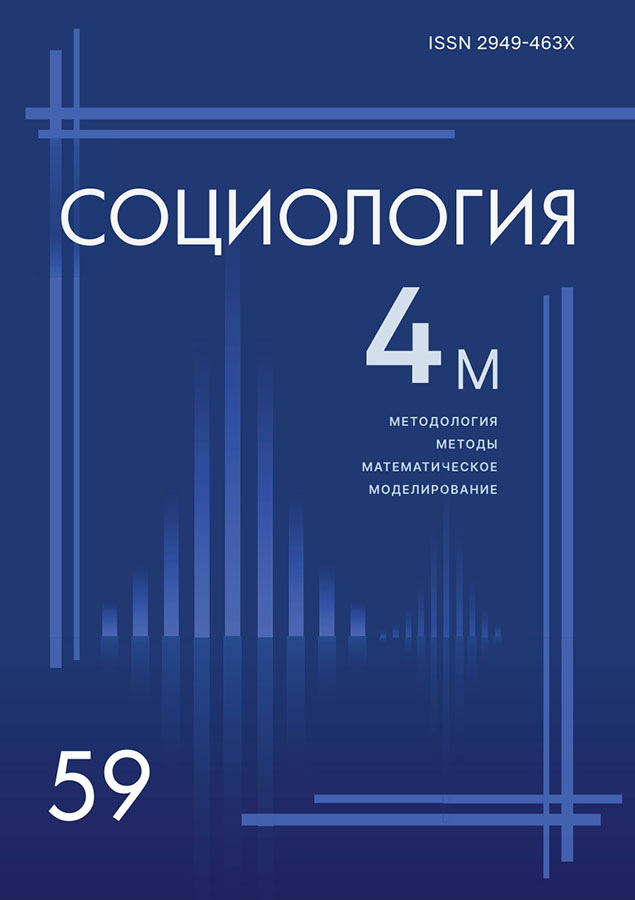Опыт разработки процедуры вторичного анализа данных об отношении к России населения зарубежных стран (на примере Японии)
- Авторы: Шаповалова М.А.1
-
Учреждения:
- Московский Государственный Университет имени М.В. Ломоносова
- Выпуск: № 59 (2024)
- Страницы: 56-91
- Раздел: Практика сбора и анализа данных
- URL: https://journal-vniispk.ru/1994-8964/article/view/279407
- DOI: https://doi.org/10.19181/4m.2024.33.2.3
- EDN: https://elibrary.ru/JAPJAJ
- ID: 279407
Цитировать
Полный текст
Аннотация
Вниманию читателей представляется основанное на обобщении опыта аналогичных исследований схематическое изложение процедуры сбора и анализа вторичных данных об отношении к России общественного мнения зарубежных стран. Каждый приводимый элемент процедуры иллюстрируется на примере исследования отношения к России японцев.Предполагается, что соответствующая приведенной схеме процедура вторичного анализа должна давать информацию, отвечающую следующим требованиям: а) надежную и достоверную; б) с насколько это возможно однозначной и ясной интерпретацией; в) имеющую прогностическую ценность. Для их обеспечения необходимо учитывать, что 1) осмысленная интерпретация текущей динамики общественного мнения требует учета его исторического состояния на длительном отрезке времени; 2) «отношение к России» или любой другой стране представляет собой сложную, неоднородную и многомерную латентную переменную, поэтому для вторичного анализа желательно включение как можно большего количества фигурировавших в различных массовых опросах различных эмпирических индикаторов; 3) при этом «отношение к России» должно рассматриваться как единая переменная, что невозможно без редукции множества индикаторов, которая обеспечивается, как минимум, их однородностью.Выдвинутые условия, применяемые к репрезентативным массовым опросам, сталкиваются с тем, что их данные обычно имеют жесткие ограничения и в количестве индикаторов, и во временном покрытии, что порождает неизбежную фрагментарность данных. Поэтому собранная информация, как правило, может быть приведена, прежде всего, к некоторым обобщенным «качественным» оценкам ситуации. Которые затем, для обобщения и интерпретации могут быть формализованно объединены в индексы (например, индекс благоприятствования). На уровне индексов открываются возможности частичного и условного заполнения пропусков во фрагментарных данных.Применение описанных принципов и приемов к общественному мнению Японии позволило получить вывод о том, что на сегодняшний день установки к России в общественном мнении Японии претерпевают самый глубокий кризис за всю постсоветскую историю, и есть все основания для того, чтобы называть настроения японского общественного мнения выраженно антироссийскими. Получение этого вывода не потребовало самостоятельного сбора эмпирических данных, все требующиеся результаты опросов уже были в наличии в открытом доступе, при этом их объем и качество позволили осуществить анализ, который кажется достаточно надежным и достоверным.
Об авторах
Мария Александровна Шаповалова
Московский Государственный Университет имени М.В. Ломоносова
Email: shapochto@yandex.ru
ORCID iD: 0009-0000-8154-8809
Студент Института стран Азии и Африки Москва, Россия
Список литературы
- Кузнецов Д. В. Китай в зеркале общественного мнения. Благовещенск: Изд-во БГПУ, 2013. 450 с. ISBN: 978-5-8331-0269-5. EDN: RQEMTL.
- Немирова Н. В. Российско-американские отношения в общественном мнении России и США // Вестник Санкт-Петербургского университета. Международные отношения. 2021, т. 14, № 4. С. 409-431. doi: 10.21638/spbu06.2021.403. EDN: ODUPBJ.
- Попов Н. П. Общественное мнение в России, США и на Украине о спецоперации // Россия и Америка в XXI веке. 2022, № 2. doi: 10.18254/S207054760019828-7. EDN: ESENJC.
- Ли Ц., Бабич Н. С. Отношение к России и США в общественном мнении современного Китая // Социологические исследования. 2023, № 4. С. 129-140. doi: 10.31857/S013216250025452-0. EDN: HFYAOG.
- Балацкий Е. В. Россия в эпицентре геополитической турбулентности: гибридная война цивилизаций // Экономические и социальные перемены: факты, тенденции, прогноз. 2022, т. 15, № 6. С. 52-78. doi: 10.15838/esc.2022.6.84.3. EDN: NHHQRV.
- Foa R. S., Mollat M., Isha H., Romero-Vidal X., Evans D., Klassen A. J. A World divided: Russia, China and the West. Cambridge, United Kingdom: Centre for the Future of Democracy, 2022. 35 p. doi: 10.17863/CAM.90281.
- Лузянин С. Г. Российско-японские отношения и китайский фактор: эволюция и трансформация (2012–2022 гг.) // Японские исследования. 2022, №. 4. С. 75-89. doi: 10.55105/2500-2872-2022-4-75-89. EDN: TLRRTZ.
- Ferguson S. D. Researching the public opinion environment: Theories and methods. London: Sage, 2000. doi: 10.4135/9781483328577. ISBN: 9780761915317.
- Clawson R. A., Oxley Z. M. Conducting empirical analysis: public opinion in action. London: Sage, 2010. 192 p. ISBN: 9781608716739.
- Buhmann A. Measuring country image: Theory, method, and effects. Wiesbaden: Springer, 2016. 163 p. doi: 10.1007/978-3-658-15407-3. ISBN: 978-3-658-15406-6.
- 外交に関する世論調査 (Public opinion poll on international affairs, 2023) (In Japanese) // Cabinet Office, Government Of Japan: [site]. 2023. URL: https://survey.gov-online.go.jp/index-gai.html (дата обращения: 13.09.2024).
- Fagan M., Poushter J., Gubbala S. Large Shares See Russia and Putin in Negative Light, While Views of Zelenskyy More Mixed // Pew Research Center. 10.07.2013. URL: https://www.pewresearch.org/global/wp-content/uploads/sites/2/2023/07/PG_2023.07.10_Russia-NATO_Report.pdf (дата обращения: 13.09.2024).
- The 9th Japan-China Public Opinion Poll: Analysis report on the comparative data, 2013 // Genron NPO: [site]. 12.08.2013. URL: https://www.genron-npo.net/en/opinion_polls/archives/5260.html (дата обращения: 13.09.2024).
- The 10th Japan-China Public Opinion Poll: Analysis report on the comparative data, 2014 // Genron NPO. 09.09.2014. URL: https://www.genron-npo.net/en/pp/docs/10th_Japan-China_poll.pdf (дата обращения: 13.09.2024).
- The 11th Japan-China Public Opinion Poll: Analysis report on the comparative data, 2015 // Genron NPO. 22.10.2015. URL: https://www.genron-npo.net/pdf/2015forum_en.pdf (дата обращения: 13.09.2024).
- The 12th Japan-China joint Opinion Poll: Analysis report on the comparative data, 2016 // Genron NPO. 09.2016. URL: https://www.genron-npo.net/pdf/2016forum_en.pdf (дата обращения: 13.09.2024).
- The 13th joint public opinion poll between Japan and China: Japan-China public Opinion survey, 2017 // Genron NPO:. 12.2017. URL: https://www.genron-npo.net/en/archives/171216.pdf (дата обращения: 13.09.2024).
- The 14th joint public opinion poll between Japan and China: Japan-China public Opinion survey, 2018 // Genron NPO. 10.2018. URL: https://www.genron-npo.net/en/archives/181011.pdf (дата обращения: 13.09.2024).
- The 15th joint public opinion poll: Japan-China public Opinion survey, 2019 // Genron NPO. 10.2019. URL: https://www.genron-npo.net/en/archives/191024.pdf (дата обращения: 13.09.2024).
- The 16th joint public opinion poll: Japan-China public Opinion survey, 2020 // Genron NPO. 11.2020. URL: https://www.genron-npo.net/en/201117_en.pdf (дата обращения: 13.09.2024).
- The 17th joint public opinion poll: Japan-China public Opinion survey, 2021 // Genron NPO. 10.2021. URL: https://www.genron-npo.net/en/pp/docs/211025.pdf (дата обращения: 13.09.2024).
- 第18回日中共同世論調査(2022年)結果 (Results of the 18th Japan-China Joint Public Opinion Poll, 2022) (In Japanese) // Genron NPO: [site]. 30.11.2022. URL: https://www.genron-npo.net/world/archives/13950-2.html (дата обращения: 13.09.2024).
- 第19回日中共同世論調査(2023年)結果 (Results of the 19th Japan-China Joint Public Opinion Survey, 2023) (In Japanese) // Genron NPO: [site]. 10.10.2023. URL: https://www.genron-npo.net/world/archives/16585-2.html (дата обращения: 13.09.2024).
- Ipsos World Affairs Global Survey, 2011 // Ipsos. 11.2011. URL:
- https://www.ipsos.com/sites/default/files/publication/2011-11/5417-ppt.pdf (дата обращения: 13.09.2024).
- Ipsos World Affairs Global Survey, 2021 // Ipsos. 11.2021. URL: https://www.ipsos.com/sites/default/files/ct/news/documents/2021-11/World-Affairs-Global-Survey-2021-Halifax-Security-Forum.pdf (дата обращения: 13.09.2024).
- Ipsos World Affairs Global Survey, 2022 // Ipsos. 11.2022. URL: https://www.ipsos.com/sites/default/files/ct/news/documents/2022-11/HISF%2022%20-%20Full%20Report.pdf (дата обращения: 13.09.2024).
- Ipsos World Affairs Global Survey, 2023 // Ipsos. 11.2023. URL: https://www.ipsos.com/sites/default/files/ct/news/documents/2023-11/ipsos-hisf-influence-report-2023-final.pdf (дата обращения: 13.09.2024).
- Vartanian T. P. Secondary data analysis. Oxford: Oxford University Press, 2010. 224 p. doi: 10.1093/acprof:oso/9780195388817.001.0001. ISBN: 9780195388817.
- Watkins D. C. Secondary data in mixed methods research. London: Sage, 2023. 264 p. ISBN: 9781506389578.
- Midford P. The influence of public opinion on foreign policy in Asia: The case of Japan // The Sage handbook of Asian foreign policy / Ed. by Takashi Inoguchi. Thousand Oaks: Sage, 2019, vol. 1. P. 381-404. ISBN: 9781473977990.
- Стрельцов Д. В. Факторы негативного образа СССР в Японии в период холодной войны // Восточная Азия: факты и аналитика. 2022, № 2. С. 32-46. doi: 10.24412/2686-7702-2022-2-32-46. EDN: VAFXXA.
- Горячева Е. А. Восприятие россиян в современной Японии: стереотипы и их преодоление // Россия и АТР. 2020, № 4(110). С. 63-71. doi: 10.24411/1026 8804-2020-10048. EDN: AGMMGG.
- Chugrov S. V., Streltsov D. V. Interdependence of Russo-Japanese relations and mutual images of Japan and Russia // Japanese Journal of Political Science. 2017, vol. 18, № 1. P. 22-40. doi: 10.1017/S146810991600030X. EDN: YVCSDL.
- Нелидов В. В. Украинский кризис во внутриполитическом дискурсе Японии // Японские исследования. 2022, № 4. С. 108-122. doi: 10.55105/2500 2872-2022-4-108-122. EDN: MOEXBZ.
- Holsti O. R. Cognitive dynamics and images of the enemy // Journal of International Affairs. 1967, vol. 21, № 1. P. 16-39.
- Herrmann R. K., Voss J. F., Schooler T. Y. E., Ciarrochi J. Images in international relations: An experimental test of cognitive schemata // International Studies Quarterly. 1997, vol. 41, № 3. P. 403-433. doi: 10.1111/0020 8833.00050.
- Sabatier P., Hunter S., McLaughlin S. The devil shift: Perceptions and misperceptions of opponents // Western Political Quarterly. 1987, vol. 40, № 3. P. 449-476. doi: 10.1177/106591298704000306. EDN: JOYMPZ.
- Kunczik M. Images of nations and international public relations. New York: Routledge, 2016. 346 p. ISBN: 978-0-805-81713-3.
- Thorsten M. Superhuman Japan: Knowledge, nation and culture in US-Japan relations. New York: Routledge, 2012. 192 p. ISBN: 9780415414265.
- Чугров С. В., Карелова Л. Б. Япония как «обычная страна»: метаморфозы политической идентичности (аналитический обзор опросов общественного мнения) // Социологический журнал. 2020, т. 26. № 1. С. 87-108. doi: 10.19181/socjour.2020.26.1.7054. EDN: DJGIYY.
- Mochizuki, M. M. The U.S.-Japan alliance and the rise of China // Beyond bilateralism: U.S.-Japan relations in the new Asia-Pacific / ed. by E. S. Krauss and T. J. Pempel. Stanford: Stanford University Press, 2004. 421 p. ISBN: 0-8047-4909-4.
- Shinoda T. Becoming more realistic in the post-cold war: Japan's changing media and public opinion on national security // Japanese Journal of Political Science. 2007, vol. 8, № 2. P. 171-190. doi: 10.1017/s1468109907002617.
- Midford P. Rethinking Japanese public opinion and security: From pacifism to realism? Stanford: Stanford University Press, 2011. 272 p. ISBN: 9780804772167.
- Bukh A. Identity, foreign policy and the other: 'Japan's Russia' // European Journal of International Relations. 2009, vol. 15, № 2. P. 319-345. doi: 10.1177/1354066109103141.
- Жилина Л. В. Восприятие России молодым поколением Японии // Вестник Российского университета дружбы народов. Серия: Международные отношения. 2018, т. 18, № 1. С. 49-65. doi: 10.22363/2313-0660-2018-18-1-49-65. EDN: YVXKJP.
- Варшавер Е. А. Теория контакта: обзор // Мониторинг общественного мнения: экономические и социальные перемены. 2015, № 5. С. 183-214. doi: 10.14515/monitoring.2015.5.13. EDN: UTUEJZ.
- Kazarinova D., Taisheva V. Perceptions of Russia in the Global World // Russia in global affairs. 2019, vol. 17, № 4. P. 20-52. doi: 10.31278/1810-6374-2019-17-4-20-52. EDN: VSHPHQ.
Дополнительные файлы










